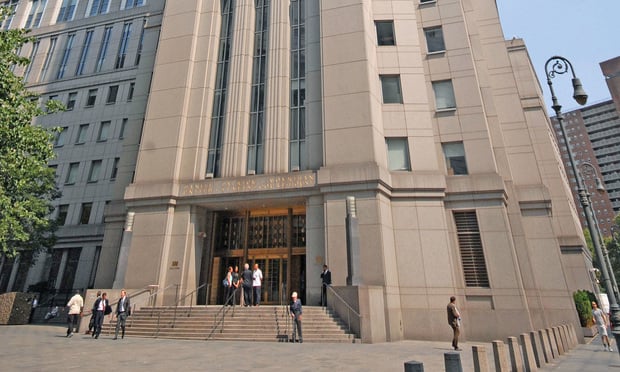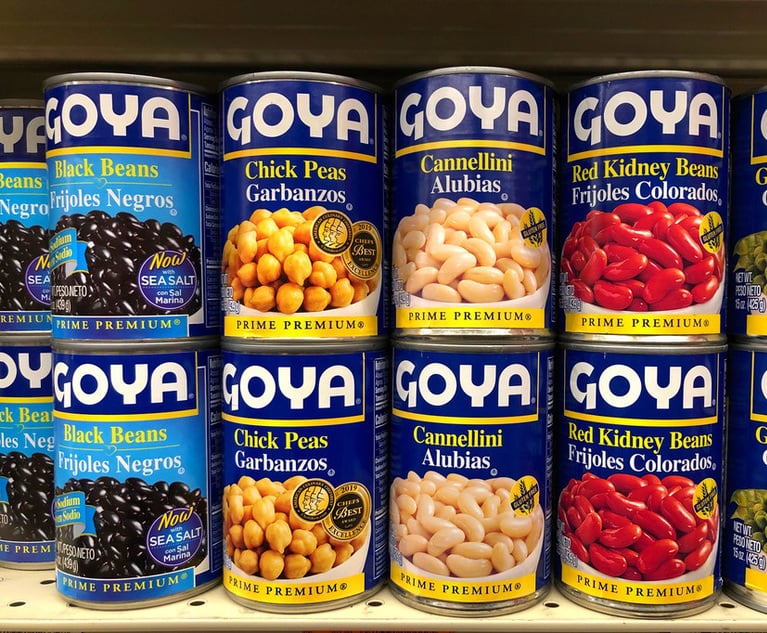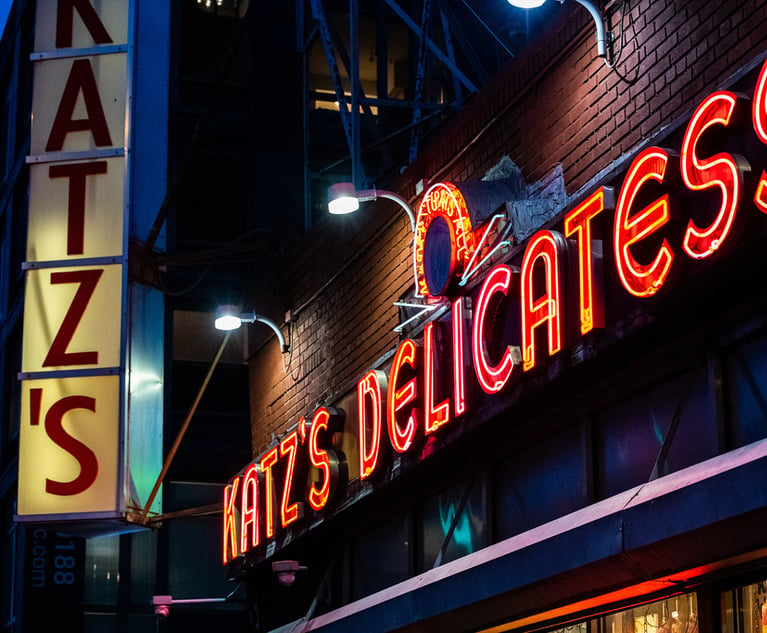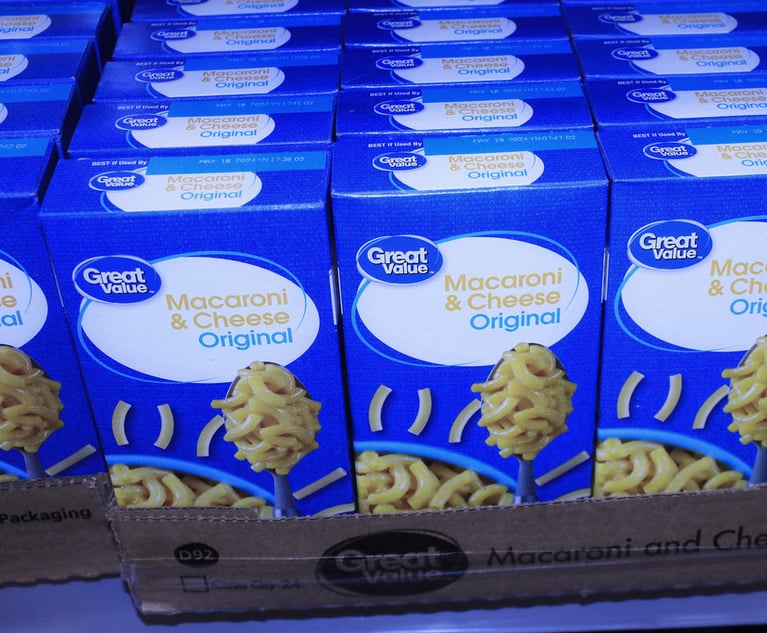Food Delivery Apps Targeted Over 'Unlawful' Contracts in Civil Antitrust Class Action
The proposed class action lawsuit, filed late Monday in the U.S. District Court for the Southern District of New York, targets GrubHub, DoorDash, Postmates and Uber Eats over their use of "no price competition clauses," which force restaurants to charge uniform prices for menu items.
April 14, 2020 at 05:25 PM
4 minute read
 Southern District of New York Daniel Patrick Moynihan U.S. Courthouse at 500 Pearl Street. Photo: NYLJ/Rick Kopstein
Southern District of New York Daniel Patrick Moynihan U.S. Courthouse at 500 Pearl Street. Photo: NYLJ/Rick Kopstein
Food delivery apps such as GrubHub and Uber Eats are using "unlawful" contracts to bolster their grip on the market for meal deliveries and drive up prices for consumers, according to a new civil antitrust suit in Manhattan federal court.
The proposed class action lawsuit, filed late Monday in the U.S. District Court for the Southern District of New York, targets GrubHub Inc., DoorDash Inc., Postmates Inc. and Uber Eats over their use of "no price competition clauses," which force restaurants to charge uniform prices for menu items, even for food orders that were not generated through their digital platforms.
The arrangement in turn prevents restaurants from offering discounts to customers who would otherwise order directly from businesses or dine-in, buying drinks and tipping waitstaff, the filing said.
"The purpose and effect of the no price competition clause is to act as an unlawful price restraint that prevents restaurants from gaining market share and increased profitability per consumer by offering lower prices to consumers," antitrust attorney Gregory Frank wrote in a 41-page complaint, filed on behalf of a group of New York customers.
"Unable to compete on the basis of price due to Defendants' unlawful restraints, restaurants have seen their precious dine-in market cannibalized by defendants' delivery apps," Frank said. "Plaintiffs bring this claim for relief on behalf of all Americans who would still to enjoy a nice dinner out with their family before Defendants make that impossible."
The three-count lawsuit alleged monopoly and price-fixing violations under the Sherman Act, claiming that each of the defendants wielded their market power to coerce restaurants into agreeing to the contractual clauses, which harmed businesses and consumers alike.
According to the complaint, Postmates and Uber Eats alone accounted for 10% and 20% of food delivery consumer spending, respectively, and were reportedly increasing revenues in 2019.
All four firms, meanwhile, charged restaurants "exorbitant fees" that ranged from 13.5% to 40% of revenue, while the average eatery's profits ranged from 3% to 9% of revenue, the filing said.
The lawsuit came as most restaurants have closed their doors due to the COVID-19 pandemic, which had "annihilated the dine-in market" and had only driven up the demand for food delivery services.
"The rise of the four defendants has come at great cost to American society," the filing said. "Defendants offer restaurants a devil's choice: in exchange for permission to participate in Defendants' Meal Delivery monopolies, restaurants must charge supra-competitive prices to consumers who do not buy their meals through the delivery apps, ultimately driving those consumers to defendants' platforms"
GrubHub, DoorDash, Postmates and Uber Eats did not respond to a request for comment.
As of Tuesday afternoon, none of the companies had responded to the suit, and an online docket-tracking service did not list counsel for the defendants.
The plaintiffs, Mariam Davitashvili, Adam Bensimon and Mia Sapienza, are represented by Gregory Frank, Marvin Frank and Asher Hawkins of Frank LLP in Manhattan.
The case is captioned Davitashvili v. GrubHub.
DoorDash, Postmates and Uber Eats are all based in San Francisco. GrubHub is based in Chicago.
READ MORE:
Garwin Gerstein to Divvy Up $18M Fee Award Following Mushroom Antitrust Settlement
Banks Agree to $337M Settlement in Price-Fixing Case
CVS, Rite Aid Accuse AstraZeneca of Conspiracy to Box Out Generic Competitors for Seroquel
This content has been archived. It is available through our partners, LexisNexis® and Bloomberg Law.
To view this content, please continue to their sites.
Not a Lexis Subscriber?
Subscribe Now
Not a Bloomberg Law Subscriber?
Subscribe Now
NOT FOR REPRINT
© 2025 ALM Global, LLC, All Rights Reserved. Request academic re-use from www.copyright.com. All other uses, submit a request to [email protected]. For more information visit Asset & Logo Licensing.
You Might Like
View All

NYC’s Oldest Deli Agrees to Update Bathrooms, Entrances to End ADA Charges
4 minute read
Ben & Jerry’s Accuses Corporate Parent of ‘Silencing’ Support for Palestinian Rights
3 minute read
Walmart Accused of Misrepresenting 'Cheese' Ingredients in Great Value's Macaroni & Cheese
3 minute readTrending Stories
- 1SurePoint Acquires Legal Practice Management Company ZenCase
- 2Day Pitney Announces Partner Elevations
- 3The New Rules of AI: Part 2—Designing and Implementing Governance Programs
- 4Plaintiffs Attorneys Awarded $113K on $1 Judgment in Noise Ordinance Dispute
- 5As Litigation Finance Industry Matures, Links With Insurance Tighten
Who Got The Work
J. Brugh Lower of Gibbons has entered an appearance for industrial equipment supplier Devco Corporation in a pending trademark infringement lawsuit. The suit, accusing the defendant of selling knock-off Graco products, was filed Dec. 18 in New Jersey District Court by Rivkin Radler on behalf of Graco Inc. and Graco Minnesota. The case, assigned to U.S. District Judge Zahid N. Quraishi, is 3:24-cv-11294, Graco Inc. et al v. Devco Corporation.
Who Got The Work
Rebecca Maller-Stein and Kent A. Yalowitz of Arnold & Porter Kaye Scholer have entered their appearances for Hanaco Venture Capital and its executives, Lior Prosor and David Frankel, in a pending securities lawsuit. The action, filed on Dec. 24 in New York Southern District Court by Zell, Aron & Co. on behalf of Goldeneye Advisors, accuses the defendants of negligently and fraudulently managing the plaintiff's $1 million investment. The case, assigned to U.S. District Judge Vernon S. Broderick, is 1:24-cv-09918, Goldeneye Advisors, LLC v. Hanaco Venture Capital, Ltd. et al.
Who Got The Work
Attorneys from A&O Shearman has stepped in as defense counsel for Toronto-Dominion Bank and other defendants in a pending securities class action. The suit, filed Dec. 11 in New York Southern District Court by Bleichmar Fonti & Auld, accuses the defendants of concealing the bank's 'pervasive' deficiencies in regards to its compliance with the Bank Secrecy Act and the quality of its anti-money laundering controls. The case, assigned to U.S. District Judge Arun Subramanian, is 1:24-cv-09445, Gonzalez v. The Toronto-Dominion Bank et al.
Who Got The Work
Crown Castle International, a Pennsylvania company providing shared communications infrastructure, has turned to Luke D. Wolf of Gordon Rees Scully Mansukhani to fend off a pending breach-of-contract lawsuit. The court action, filed Nov. 25 in Michigan Eastern District Court by Hooper Hathaway PC on behalf of The Town Residences LLC, accuses Crown Castle of failing to transfer approximately $30,000 in utility payments from T-Mobile in breach of a roof-top lease and assignment agreement. The case, assigned to U.S. District Judge Susan K. Declercq, is 2:24-cv-13131, The Town Residences LLC v. T-Mobile US, Inc. et al.
Who Got The Work
Wilfred P. Coronato and Daniel M. Schwartz of McCarter & English have stepped in as defense counsel to Electrolux Home Products Inc. in a pending product liability lawsuit. The court action, filed Nov. 26 in New York Eastern District Court by Poulos Lopiccolo PC and Nagel Rice LLP on behalf of David Stern, alleges that the defendant's refrigerators’ drawers and shelving repeatedly break and fall apart within months after purchase. The case, assigned to U.S. District Judge Joan M. Azrack, is 2:24-cv-08204, Stern v. Electrolux Home Products, Inc.
Featured Firms
Law Offices of Gary Martin Hays & Associates, P.C.
(470) 294-1674
Law Offices of Mark E. Salomone
(857) 444-6468
Smith & Hassler
(713) 739-1250






